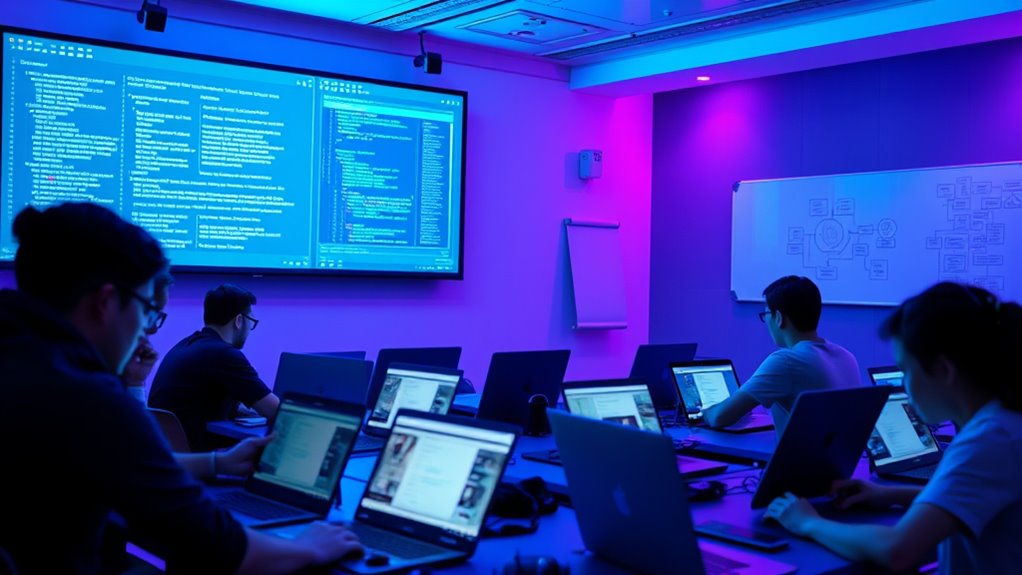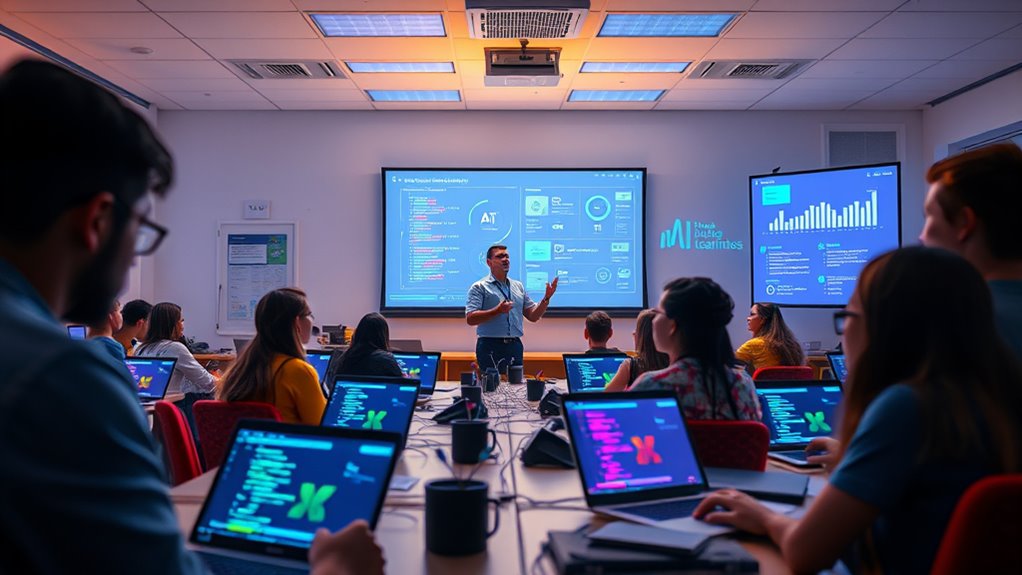In an AI-enhanced coding bootcamp, students benefit from instant, personalized feedback that highlights errors and suggests improvements, making learning more efficient. AI also promotes collaboration by assigning roles and automating peer reviews, fostering teamwork and critical thinking. This approach creates a dynamic environment that adapts to individual paces and provides continuous insights, boosting confidence and skills. Keep exploring to discover how these innovative tools can transform your learning experience further.
Key Takeaways
- AI provides instant, personalized feedback on student code, accelerating learning and reducing instructor review delays.
- The case study highlights improved student confidence and faster skill development through real-time insights.
- AI facilitates peer collaboration by assigning roles and automating initial code reviews, promoting teamwork.
- The learning environment becomes more interactive and diverse, exposing students to multiple coding approaches.
- Overall, AI integration enhances technical growth, collaboration skills, and prepares students for competitive tech careers.

As coding bootcamps seek to improve student outcomes, many are turning to artificial intelligence to personalize learning and boost engagement. One key way AI is transforming these environments is through providing personalized feedback. Instead of waiting days for instructors to review code, AI-powered systems analyze your work instantly, highlighting specific errors and suggesting tailored solutions. This immediate, customized feedback helps you understand mistakes clearly and learn more efficiently. It also allows you to focus on areas where you need the most improvement, rather than wasting time on concepts you’ve already mastered. Because AI adapts to your pace and skill level, your learning experience becomes more targeted and effective, leading to faster progress and greater confidence.
AI provides instant, personalized feedback, helping you learn faster and focus on what matters most in your coding journey.
Equally important is how AI fosters peer collaboration. Many bootcamps incorporate AI tools that facilitate group projects and peer reviews, encouraging you to work closely with classmates. These systems can assign roles based on individual strengths or suggest ideal groupings to maximize learning outcomes. When you collaborate using AI, you’re pushed to articulate your thought process and review others’ code critically, which deepens your understanding. AI can also automate the initial review of peer submissions, providing constructive feedback that helps everyone improve. This integration of AI ensures that peer collaboration isn’t just a social activity but a strategic part of your learning journey, promoting shared problem-solving and communication skills. Additionally, understanding conflict resolution skills can help mitigate misunderstandings that may arise during collaborative projects.
The combination of personalized feedback and peer collaboration creates a dynamic learning environment. AI helps you identify your weaknesses and offers specific guidance on how to address them, making your practice sessions more productive. Meanwhile, working with peers through AI-supported platforms exposes you to diverse approaches and perspectives, broadening your understanding beyond individual efforts. This interconnected system nurtures a community where feedback flows both from AI and from your classmates, fostering continuous improvement. It also encourages accountability, as you and your peers are motivated to improve collectively, knowing that AI tracks progress and provides data-driven insights. Incorporating real-time analytics further enhances the effectiveness of this approach by providing immediate data on your performance.
Ultimately, leveraging AI for personalized feedback and peer collaboration transforms the traditional classroom into a highly responsive, interactive space. You gain immediate insights into your coding skills, while engaging with others in meaningful ways that enhance learning. This approach not only accelerates your technical growth but also builds collaboration skills essential for real-world software development. As bootcamps adopt these AI-driven strategies, you’re better equipped to succeed in competitive tech environments, making your learning experience more engaging, efficient, and tailored to your individual needs.
Frequently Asked Questions
How Does AI Tailor Learning Experiences for Individual Students?
AI tailors learning experiences for you by creating personalized curricula based on your strengths and weaknesses. It uses adaptive assessments to identify areas where you need improvement and adjusts content accordingly. As you progress, AI continuously analyzes your performance, providing targeted feedback and challenges. This dynamic approach guarantees you stay engaged and learn efficiently, making the educational journey more effective and customized to your individual needs.
What Challenges Are Faced When Implementing AI in Bootcamps?
You face challenges implementing AI in bootcamps, where ethical concerns and technical limitations collide. While AI can personalize learning, it risks bias and privacy issues if not handled carefully. Technical hurdles like data quality and system integration slow progress. Balancing innovation with ethics and overcoming these hurdles requires careful planning, but failing to do so can undermine trust and effectiveness, making the journey complex yet essential for success.
How Do Students Perceive Ai-Driven Feedback Compared to Traditional Methods?
You might find that students perceive AI-driven feedback as more immediate and personalized than traditional methods, which boosts their motivation. It encourages peer collaboration since students can compare AI insights with peer reviews. This approach helps maintain engagement and fosters a sense of progress, making learning more dynamic. Overall, AI feedback is often seen as a valuable tool that enhances motivation and supports collaborative learning experiences.
What Are the Long-Term Impacts of AI on Coding Proficiency?
Imagine you master a new coding skill faster with AI’s personalized feedback. Long-term, AI can improve your algorithm efficiency and facilitate skill transfer across projects. For example, a student might develop better problem-solving habits, boosting proficiency in various languages. Over time, AI tools help you refine techniques, making your coding more efficient and adaptable. This ongoing learning process leads to sustained growth and increased confidence in your abilities.
How Is Student Privacy Maintained During AI Data Collection?
You can guarantee student privacy during AI data collection by implementing strict consent protocols, so students know how their data is used. Additionally, data anonymization techniques protect identities by removing personal identifiers. These measures help maintain trust and comply with privacy regulations, allowing you to gather valuable insights without risking student confidentiality. By prioritizing transparency and security, you create a safe environment for learning and data sharing.
Conclusion
By embracing AI-enhanced learning, you’re opening doors to personalized growth and faster mastery of coding skills. This approach helps you stay ahead of the curve and turn challenges into opportunities. Remember, in technology as in life, it’s often the early bird that catches the worm. Keep leveraging innovative tools, and you’ll find yourself not just keeping up, but leading the way in your coding journey.








